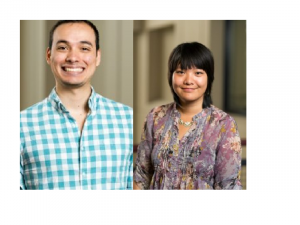Presented By: Department of Psychology
Social Brown Bag:
Koji Takahashi and Iris Wang, Graduate Students, Social Psychology

Koji Takahashi
Title:
Extraneous affect and selective attention to health information
Abstract:
Health messages often fail to reach their intended audiences. A major reason is that health messages evoke negative emotions, motivating people to divert their attention. Many efforts to promote attention involve changing message content to make information less threatening. For some information, however, the topic itself evokes negative emotions, making it difficult or impossible to remove threat from the messages. In this talk, I will discuss evidence that extraneous affect, or emotional states unrelated to a message, can be leveraged to promote attention to health messages. I will present results from four studies showing that using guided meditation to induce low-arousal positive affect leads to greater attention to and comprehension of health messages. Importantly, we find that the valence and arousal of extraneous affect impact message processing in different ways and that these effects do not depend on how threatening people otherwise find the health information.
Iris Wang
Title
Covid at the Ballot Box: How Covid-19 impacts perceptions of voting
Abstract
The Covid-19 outbreak has greatly challenged many aspects of American life, including its electoral system. One large debate that has stemmed from the crisis is how the 2020 election should be held in a safe way, given that the polls are socially dense places with high likelihood of disease transmission. Previous work on the behavioral immune system, a set of behaviors that are designed to prevent people from coming into contact with infectious disease, has shown that disease threat increases crowding perceptions of socially dense situations. In a recent study, we tested the hypothesis that Covid-19 threat would increase people's perceptions of polling places as dangerously crowded, and therefore increase people's support for alternative voting methods such as mail-in and extended early voting. This brownbag explores the findings from this recent study.
Title:
Extraneous affect and selective attention to health information
Abstract:
Health messages often fail to reach their intended audiences. A major reason is that health messages evoke negative emotions, motivating people to divert their attention. Many efforts to promote attention involve changing message content to make information less threatening. For some information, however, the topic itself evokes negative emotions, making it difficult or impossible to remove threat from the messages. In this talk, I will discuss evidence that extraneous affect, or emotional states unrelated to a message, can be leveraged to promote attention to health messages. I will present results from four studies showing that using guided meditation to induce low-arousal positive affect leads to greater attention to and comprehension of health messages. Importantly, we find that the valence and arousal of extraneous affect impact message processing in different ways and that these effects do not depend on how threatening people otherwise find the health information.
Iris Wang
Title
Covid at the Ballot Box: How Covid-19 impacts perceptions of voting
Abstract
The Covid-19 outbreak has greatly challenged many aspects of American life, including its electoral system. One large debate that has stemmed from the crisis is how the 2020 election should be held in a safe way, given that the polls are socially dense places with high likelihood of disease transmission. Previous work on the behavioral immune system, a set of behaviors that are designed to prevent people from coming into contact with infectious disease, has shown that disease threat increases crowding perceptions of socially dense situations. In a recent study, we tested the hypothesis that Covid-19 threat would increase people's perceptions of polling places as dangerously crowded, and therefore increase people's support for alternative voting methods such as mail-in and extended early voting. This brownbag explores the findings from this recent study.